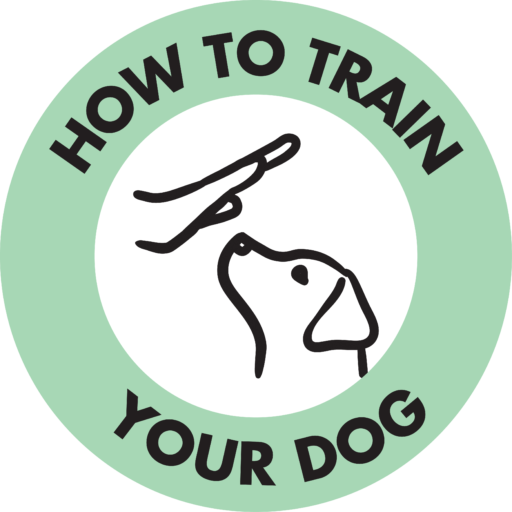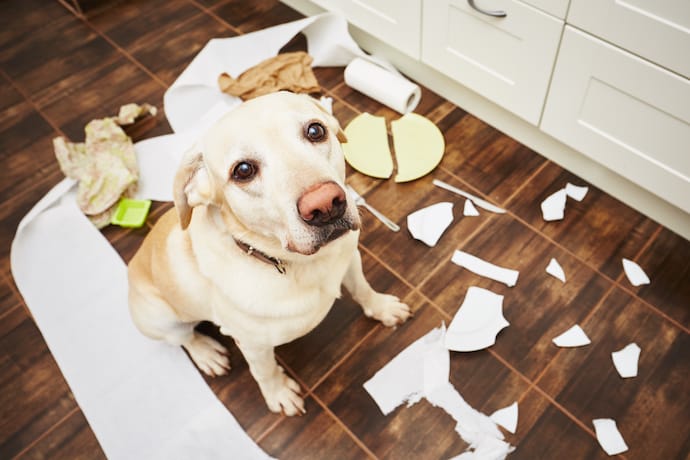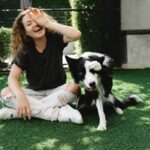Anyone who’s ever had a puppy knows that they love to chew. Their little teeth are razor-sharp, and they can definitely destroy any items that are within easy chewing distance.
Puppies biting and chewing can be adorable and even funny at first — until they start ripping apart your furniture, shoes, and more.
So, why is your puppy biting everything they can get their teeth on? Have you wondered how to stop your dog from chewing everything? In this article, we’re going to explore the reasons why your puppy or dog is chewing everything in sight, as well as easy solutions you can implement to put a stop to it.
Why Do Dogs Chew?
There are lots of reasons why a dog of any age would start chewing. Here are some of the major causes:
1. Teething
Puppies start teething between three and seven months of age. If your dog is teething, they’ll have a lot of discomfort in their gums, and they will have an urge to chew.
At this age, your puppy doesn’t know the difference between their chew toys and your slippers, which means you need to take precautions (such as hiding away your shoes until your puppy is through this stage). The best teething toys for puppies are rubbery and chewable, but also tough and durable. Getting a bunch of these to keep your furry friend busy is definitely a good idea!
2. Attention-Seeking
It’s hard not to react when you see that your puppy has destroyed your favorite pair of shoes. However, if your puppy learns that chewing something will get you out of your armchair and chasing them around the house, they might chew deliberately to get a reaction if they feel you’re not giving them enough attention.
3. Boredom
A bored puppy will try and entertain itself. Boredom can make dogs become destructive, ripping up furniture or chewing rugs to keep themselves entertained. This is why it’s so crucial to make sure your dog has lots to keep them busy, such as toys and chews.
4. Distress
Distressed puppies can also become destructive. Chewing is a regular symptom of separation anxiety, especially if you leave your dog alone for long periods. Again, entertainment is key here!
5. Pent-up Energy
High-energy dogs, such as working breeds, need to burn off a lot of energy. If their exercise needs aren’t being met, you might notice naughty behavior in your dog like biting, chewing, and quickly zooming around the house.
6. Discomfort
Puppies chew when they’re teething, but older dogs might chew to relieve some kind of gum or tooth problem. If your dog suddenly starts chewing when they have plenty of toys available and have had no problems with chewing before, you may want to get their teeth checked out at the vet. If this is the case, you might also notice your dog chewing paws or showing other signs of distress.
7. Bad Habits
If you bring a new puppy or older dog into your home that immediately starts chewing, it’s possible that your dog’s previous owners allowed the dog to chew whatever it liked, and it’s now become a habit. You need to act quickly to break the bad habit.
8. Not Enough Chew Toys
If you don’t provide toys or chew toys for your pet, they’ll find something else to chew. That something else will probably be something valuable of yours, such as your shoes, furniture, or anything else within easy reach.
9. Lack of Mental Stimulation
Dogs don’t just need physical exercise. Dogs and puppies need training, playtime, and mental stimulation. If you don’t play with your puppy enough, they may resort to chewing.
10. They Are Puppies
Unfortunately, chewing could just be a phase that your puppy goes through. Virtually every puppy tries to chew at some point, and it’s up to you as the owner to train your pet out of this habit.
How to Stop Your Dog Chewing
Now we come to the most important part of all — how to stop your dog chewing! Inevitably, you don’t want your puppy or dog destroying expensive items within your home. So, what can you do?
1. Puppy-Proof Your House
Let’s be clear: If you don’t want your puppy to chew items in your home, you need to keep them away from your puppy. Keep dangerous items, like electrical cables and things your puppy can swallow, well out of the way.
You may also want to put up a puppy gate while training them to keep them in one set play area so that you don’t have to worry about always putting everything away when you leave your home.
2. Provide Plenty of Alternative Chew Toys
Your puppy is going to chew things. So, it’s up to you to provide suitable chew toys for your dog, like rawhide bones, tug toys, or Kong toys, which are some of the best chew toys for puppies. Indestructible dog toys, like bully sticks for dogs, can keep your pup entertained and also ensure you don’t necessarily have to go replacing your dog’s toys every day or week.
3. Use Positive Reinforcement
It’s important to realize that your puppy isn’t chewing out of spite. Punishment doesn’t work, and you might end up teaching your dog to be afraid of you. Rather than punishing “bad” behavior, reward the behavior you want to see. Redirect your dog’s attention to suitable chew toys instead.
4. Make Items Unpleasant to Chew
You can’t move every chewable item away from your puppy, but you can make them taste unpleasant. Rub products like garlic, tabasco sauce, or other strong-smelling things on furniture legs to dissuade your dog from chewing.
5. Don’t Allow Your Dog the Run Of The House
Finally, you should use confinement to stop your puppy from running amok. Crate training is a good place to start, and you should never let your dog have the run of the house until they’re completely trained.
Alternatively, as previously mentioned, you can block an area of the house with gates for your puppy to roam around and play while you’re out of the house. At the same time, practice caution here as they grow! It wouldn’t be the first time a puppy has jumped over a gate when left alone.
The Bottom Line…
Chewing is a natural thing, and you shouldn’t be surprised when your dog shows a natural tendency to chew, especially if they’re just a puppy! With a little training and patience, you can teach your dog to chew their own toys — not your shoes.



